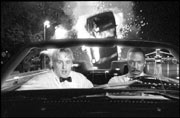I SPY
directed by Betty Thomas
opens Nov. 1 at Kirkland Parkplace, Varsity, and others
I Spy wasn’t just one of the best shows in TV history, it was a historic irruption of A-film values into TV’s sea of cheese. In creating the 1965-68 series, co-writer/star Robert Culp and Dick Van Dyke Show producer Sheldon Leonard (who threw Jimmy Stewart out of his bar in the nightmare scene of It’s a Wonderful Life) threw out everything that was stupidly brutalitarian in the then-hot spy genre: noisy violence, heartless sex, fake sets, cutout characters, Cold War triumphalism. It’s about the only major 1960s spy hit that offered nothing for Austin Powers to mock.
Culp (posing as tennis star Kelly Robinson) and Bill Cosby (playing his trainer, Alexander Scott) didn’t need explosions; they had chemistry. Shooting on actual foreign locations, they made their characters seem real—hip, funny, swapping improvisatory banter so fast they fused into one seriocomic creation. Incredibly, they made race irrelevant at the moment of Civil Rights. They even smuggled in a bit of le Carr駳 subversive grief. Their show was to the reigning spy dramas what ’60s Marvel was to DC Comics—a thrilling humanistic rebuke to a bloodless clich鮍
THE OLD SHOW (abundant on DVD) is way better than the new movie adaptation, in which Eddie Murphy as Kelly Robinson (now a boorish boxer) and Owen Wilson (as semi-bumbling spy Alex Scott) visit Budapest to squelch the sale of an invisible stealth fighter jet. The Murphy version is painless to sit through, but it’s a painful waste of a potential film franchise. The remarkably clumsy director, Betty Thomas, has renounced the humanism of her breakthrough hit Private Parts, reprising the more profitably tasteless cinematic candy of Dr. Dolittle (also with Murphy). After one of I Spy‘s many chase-scene conflagrations, Wilson’s character murmurs, “Now, that’s a big explosion.” It’s a good explosion, but not a great explosion.
The new movie wants to beat 007 at its own empty generic game, with a bit of hip flipness in the mix. Murphy and Wilson are proven funnymen, but they don’t play well together. One of the film’s best bits symbolizes the problem: Wilson gives Murphy a contact-lens camera gizmo that displays to Murphy whatever Wilson’s eyes are seeing. Murphy sees a split-screen image, half his POV, half Wilson’s. When Murphy, watching from another room, advises milquetoast Wilson in his courtship of dishy spy Famke Janssen, it’s fairly amusing to hear their respective readings—from concupiscent Murphy, then from adenoidally undersexed Wilson—of lines like, “I need . . . sexual healing.”
But that’s the whole problem: The movie is split into Murphy’s bit (a competent, uninventive rendering of a braggadocious clown) and Wilson’s bit (a nebbishy self-doubter). The black guy rants, the white guy whines, but they’re not on the same page. Race utterly defines their relationship—or would, if they had one. Only old folks will bitterly remember how much better the race-blind TV characters played it. Everyone else will bitterly remember how much better almost every other black/white movie buddy team was, and how clich餠the whole notion is by now.
At least Murphy and Wilson are, separately but equally, entertaining. Every other character and situation in I Spy is calamitously hackneyed. As the bad guy arms dealer, Malcolm McDowell does little but display his brattish face’s sad decay. As a vampy double-or-triple agent, Janssen has the dimmest female role in some time—and makes the least of it. A subplot involving Wilson’s superspy rival for Janssen’s affections—the Banderas-like Carlos (Gary Cole)—is too subpar to be believed.
IT TURNS OUT there is a certain level of believability an action picture must maintain if it’s going to work. The scenes of I Spy are so bereft of logical or dramatic connection that one feels as if they were making it up as they went along, only it’s also bereft of spontaneity. Wilson’s character is fuzzily written, too; he’s supposed to be a loser, but he keeps performing perfectly adequately in 007 shoes. When he reverts to his failure persona, he fails to convince.
Bill Cosby was the star of the original show, blazing out of nowhere like a comic comet, yet intense and affecting, too. (Culp called him “the angriest man I ever met.”) Even his smash comedy albums didn’t prepare us for his greatness as an actor. I Spy was the real Cosby show. Eddie Murphy is at the opposite end of a luminous transit. He plays the top dog, not the underdog. And he puts the role to sleep.









